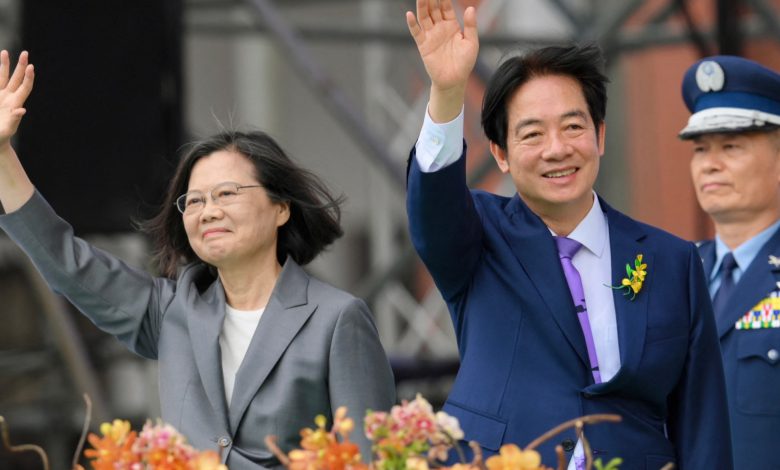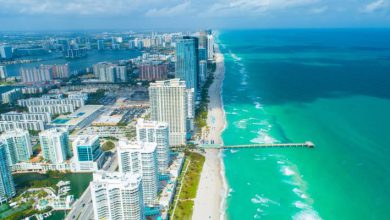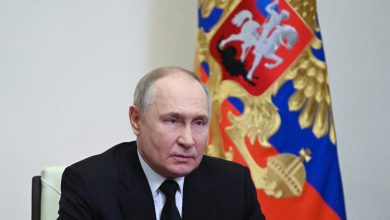
Taipei, Taiwan – William Lai Ching-te has been sworn in as president of Taiwan in a ceremony that included a 21-gun salute, as he later praised the self-governing island’s democracy and urged China to stop its “intimidation”.
Lai and Vice President Hsia Bi-khim took their oaths on Monday beneath a portrait of Sun Yat-sen, the founder of the Republic of China (ROC), the formal name for Taiwan’s government, in a ceremony at the presidential building in Taipei.
The 64-year-old was given two seals that symbolise presidential power from the parliament speaker – one the ROC seal and the other a th seal of honour. Both were brought to the island by the Nationalists in 1949 after they lost China’s civil war to the communists.
Outgoing President Tsai Ing-wen also bid farewell during the ceremony, signing off after eight years and a maximum two terms in office.
Addressing the crowds gathered at the presidential building, Lai noted the significance of May 20, the day in 1949 when martial law was imposed and also the day in 1997 when Taiwan’s first popularly elected president was sworn into office “signalling to the international community that the Republic of China, Taiwan, is a sovereign and independent nation with sovereignty resting in the people”.
He stressed Taiwan would make no concessions on its democracy and freedoms and called on Beijing to “cease political and military intimidation”.
Beijing claims Taiwan as its own and has not ruled out the use of force to achieve its goals. Throughout Tsai’s two terms in office it sent military aircraft and ships near to the island and has continued to do since Lai, who it considers a “separatist” and a “troublemaker”, emerged the victor in January’s elections.
Representatives from 29 countries joined the ceremony on Monday, including those from Taiwan’s last 12 diplomatic allies in the Pacific, Central America and the Holy See.

Former United States Secretary of State Mike Pompeo attended, as did Former Lithuanian President Dalia Grybauskaite and representatives of foreign “economic” or “trade” offices that serve as de facto diplomatic missions for countries that maintain formal ties with Beijing.
US Secretary of State Antony Blinken sent a message of congratulations and said Washington looked forward to working with Lai to “deepen our longstanding unofficial relationship, and maintain peace and stability across the Taiwan Strait”.
‘Sincere’
As well as the dignitaries, members of the public and party supporters also turned out for the festivities, which included a military parade and traditional drum and dance performances, celebrating Taiwan’s cultural heritage.
Lisa Wu flew back to Taiwan from Los Angeles with her family to attend the ceremony, and was seated among supporters of Lai’s Democratic Progressive Party.
Wu said she admired Lai, the son of a coal miner who later qualified as a doctor, describing him as a “sincere” political leader. She previously flew back from the US to vote for him in January’s elections.

Sitting in a section for supporters of Lai’s Democratic Progressive Party, Wu said she left Taiwan 50 years ago to find better opportunities in the US. At the time, native Taiwanese descended from families who predated the arrival of the ROC government had fewer opportunities, but the distinction has faded in contemporary Taiwan.
Wu said she has returned to Taiwan since 2000, shortly after Taiwan’s transition to democracy, and has voted in every presidential election.
Samantha Yu, president of the Global Federation of Chinese Business Women, also returned from California to attend the event.
“This is a really special day,” Yu told Al Jazeera. “For democracy right now, we are so worried about maybe China will try to attack us and protecting our island and democracy is so important. I was born here, and I live in the Untied States right now and just really hope people here can continue to enjoy democracy.”
Miffy Jiang attended the ceremony dressed in traditional clothing from the Atayal indigenous group.

Jiang said while she is not Atayal herself, she wanted to raise awareness and visibility for Taiwan’s 12 indigenous groups.
“Although I am not an indigenous person, I feel that indigenous people are also part of our family, so they should be counted as well,” she said. “We have some differences from them historically, but from my perspective, we still believe that they and their communities are historically part of Taiwan.”
There was no immediate comment in China’s state media on Lai’s inauguration.
In a story published ahead of the ceremony, the state-run Global Times tabloid referred to Lai as a “regional leader”.
Source link



